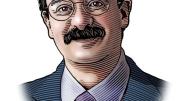The world’s big problems are often caused by narrow, reductionist solutions. Yet the whole, said Aristotle, is different from the sum of its parts. We need people with vision that crosses boundaries, harnessing hidden connections to solve or avoid not just one problem but many, without making more. Problems created by blinders require “un-disciplined” people educated in the disciplined practice of linking supposedly disparate learnings. Yet holism is scarce. Universities discourage it due to academic tribalism, a fear that a broad education can’t be deep, and a solicitous urge to shield students from exuberantly transdisciplinary impulses.
My two years at Harvard included taking a freshman seminar with Edward Purcell open to all freshmen named Lovins, hanging out with great mentors like John Finley and Leonard Nash and William Lipscomb and Willard van Orman Quine (and, off-campus, Edwin Land), taking the senior physical-science research courses in year one and the graduate research courses in year two, and exploring geology and law, linguistics and Social Relations. (In high school I’d delved in music, classics, and college math.)
Yet this wonderful intellectual playground had ogres. The College’s administration plugged loopholes not just behind but ahead of me, blocking access to the education I sought. Continuing to study widely without a specific concentration, they warned, was too risky. I asked, Isn’t this a great university? Yes, they said, but for your own good we require focus. Can’t I choose how to spend my own time and money? No.
They weren’t customer-friendly, so halfway through, I migrated to Oxford as a graduate student to study whatever I wanted, becoming a don two years later. (That worked well until 1971 when I wanted to do a doctorate in energy—not yet an academic subject two years before the oil embargo—so I resigned to do energy anyway. Now energy has professors.)
I subversively advise students that if their studies are so disparate their advisers can’t discern a pattern, they’re probably on the right track. Wonder in the bewilderness. Go wild. Mix thermodynamics with Chinese art history with cultural anthropology with naval architecture and you’ll learn how to learn.
I tell students a smart, motivated person can learn as much about almost any discipline in six months as most (not all!) practitioners know. I encourage them to roam uninhibited across the entire range of learning, leaping the fences and walking on the grass. I mention that at nine universities, I’ve taught only subjects I’ve never formally studied, and that my line of work requires picking up a couple of new disciplines a year, so that after several decades, everything reminds you of something.
I therefore hope for a Harvard that reunites dis-integrated learning and takes E.O. Wilson’s Consilience seriously; where the fences fall into disrepair; where a rich mycelium organizes around grand challenges (as current White House science adviser and Heinz professor of environmental policy John Holdren’s still-unique Energy and Resources Group so splendidly did at Berkeley); where dropouts, if any, are asked why they left; where responsible students in any year, anywhere in the University, can freely choose all their studies; and where integration is prized above reductionism. That is what the world needs.
Recovering physicist Amory B. Lovins ’68, the co-founder, chairman, and chief scientist of Rocky Mountain Institute (www.rmi.org), advises business and government leaders on energy efficiency and strategy and their links to security, economy, the environment, and development. His latest disruptive advice to students is a 2011 UC, Berkeley Natural Sciences address.









